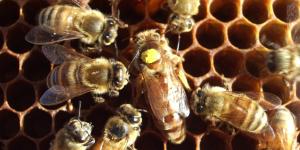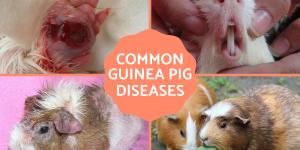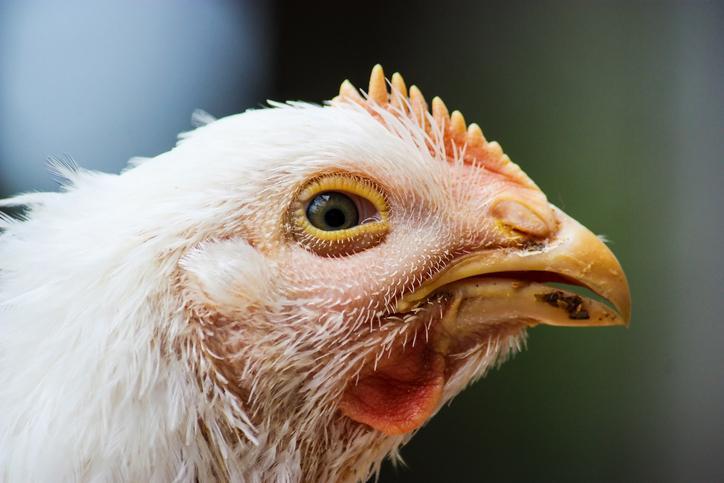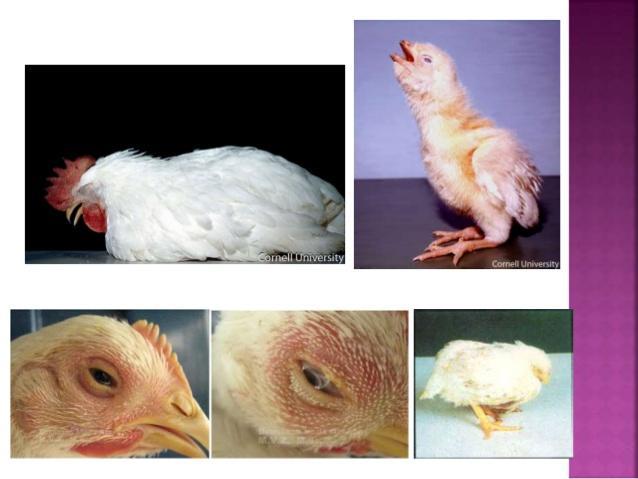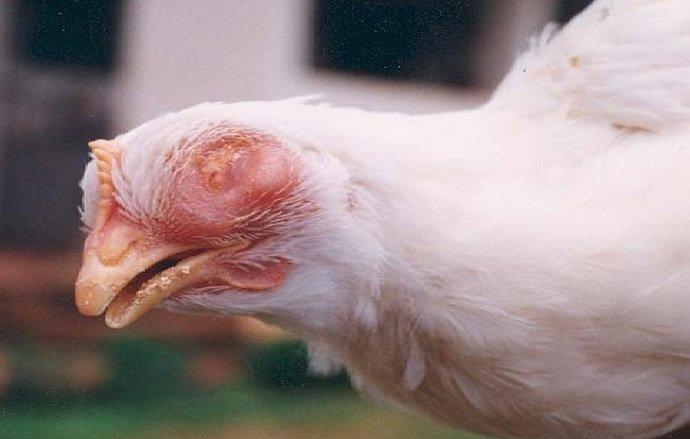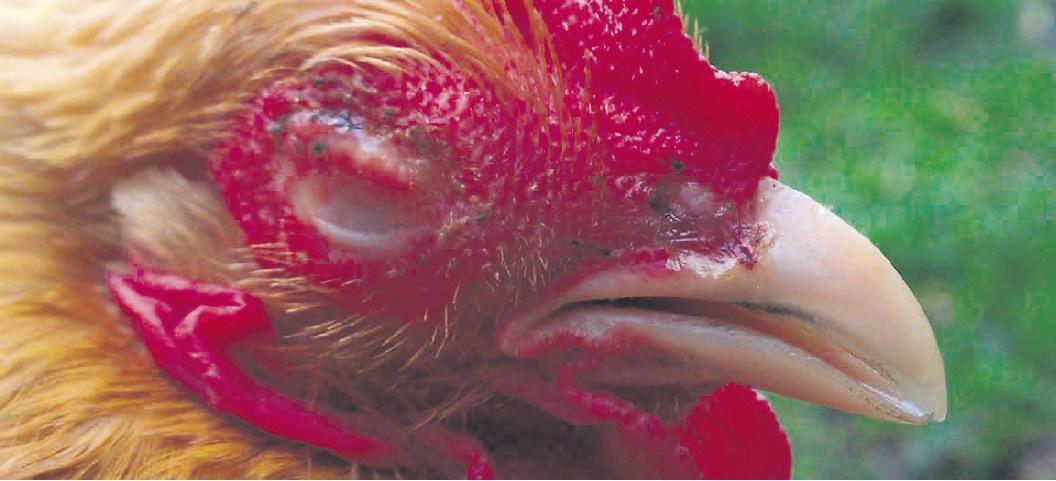15 Common Chicken Diseases - Causes And Symptoms

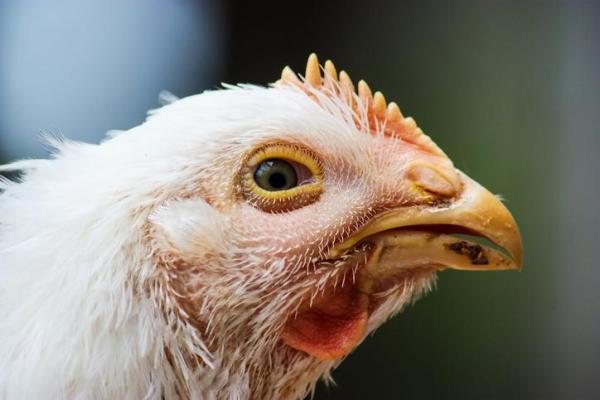
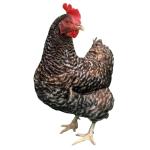
See files for Hens and roosters
The first thing you should know is that there are a large number of diseases and parasites that can affect chickens. As a chicken or poultry carer, it is essential that you are able to recognize symptoms of the most common chicken diseases and viruses, especially in the case of treating them accordingly and efficiently. Many chicken diseases present similar symptoms, which is why it is important to consult a veterinarian as soon as any of the below symptoms are noticed.
For more about the most common poultry diseases, keep reading here at AnimalWised. Not only will we be discussing their most common causes and symptoms, but we’ll also include the most common chicken diseases that affect humans, and how to avoid them.
- Chicken diseases: symptoms
- Most common poultry diseases
- Baby chick illnesses
- Chicken eye disease
- Avian pox in chickens
- Red mites on chickens
- Gout in poultry
- Chicken lice
- Infectious bronchitis in chickens
- Newcastle disease in chickens
- Avian cholera
- Avian influenza in poultry
- Infectious coryza in chickens
- Mycoplasmosis in chickens
- Chicken diseases that affect humans
Chicken diseases: symptoms
The most common symptoms of chicken diseases or viruses according to the classification of poultry diseases include:
- Anorexia. Your chicken will not eat and/or drink
- Secretion emission through the nose and eyes
- Excessive noise whilst breathing
- Coughing
- Absence or decrease in egg laying
- The appearance of deformed or weakened egg (when layed)
- Diarrhea with a bad smell
- Lethargy
- Skin alterations
- Poor feather quality
- Lack of reaction to stimuli
- Hiding and fear
- Thinning
- Difficulties standing up
Lastly, one of the most common symptoms of an ill chicken is the loss of feathers. This can be caused by numerous things including improper feeding, the pecking of other chickens, physiological change, stress or disease. A loss of feathers, or lack thereof, are generally a symptom of a problem, rather than a diseases in itself.
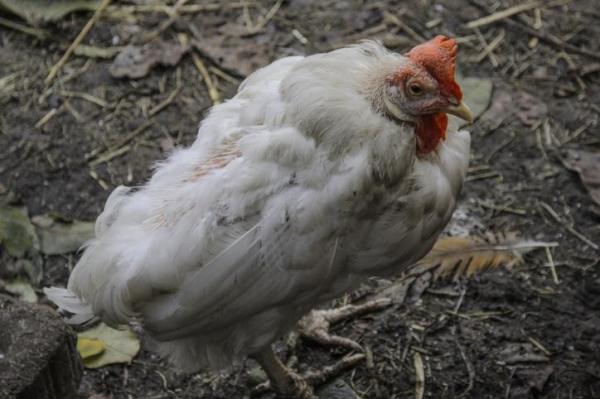
Most common poultry diseases
The first thing one would need to clarify when discussing the most common chicken diseases, is that they all present similar symptoms, making it easy to confuse them. Additionally, most chicken diseases and viruses are incredibly contagious, and therefore need to be isolated and treated accordingly.
Here at AnimalWised we recommend poultry disease control and prevention rather than cure. The best way to prevent these common chicken diseases in your poultry is by offering your animals adequate care, accommodation and feed. Keep reading below to find out more about the most common chicken diseases.
Baby chick illnesses
The most common baby sick chicken diseases include:
Marek's disease
Marek's disease in chickens groups several very contagious viral pathologies that cause tumors and paralysis in chickens. There is a Marek’s diseases vaccine, however, it does not prevent vaccinated chickens from spreading the disease to unvaccinated birds. Because this vaccine is not always effective, proper hygiene and adequate living conditions are key when it comes to preventing its appearance. There is not Marek’s disease treatment, but chicks can still survive if offered the correct diet and appropriate environment.
Coccidiosis in chicks
Coccidiosis in chickens is the leading cause of chick death. Coccidiosis in chickens is a parasitic disease of the digestive tract and it is incredibly contagious. Coccidiosis in baby chicks symptoms include blood in the stool and the inability to defecate. The most common causes of coccidiosis in chickens include stress, temperature changes, mishandling, etc.
Chicks suffering from coccidiosis may also present torticollis, which results in the inability to keep their heads up. in addition, these chickens may also walk backwards. For more, we recommend reading our article where we discuss everything you need to know about coccidiosis in birds.
Hereditary diseases in chickens
The most common hereditary or genetic diseases in chicken often affect their beaks and/or leg. These such pathologies can lead to difficulty feeding and walking. When it comes to these malformations, one must ensure that the chicks are able to feed. Offer your chick soft food and raise the feeder if necessary.
Hereditary diseases in chicken are often caused by incorrect incubator temperature and/or a deficit of necessary vitamins.
Respiratory diseases in chicks
Lastly, the most common chick pathologies include respiratory problems, which can vary in severity. Symptoms of these include ocular and nasal discharge and/or coughing or sneezing.
For more, read how do chickens reproduce?
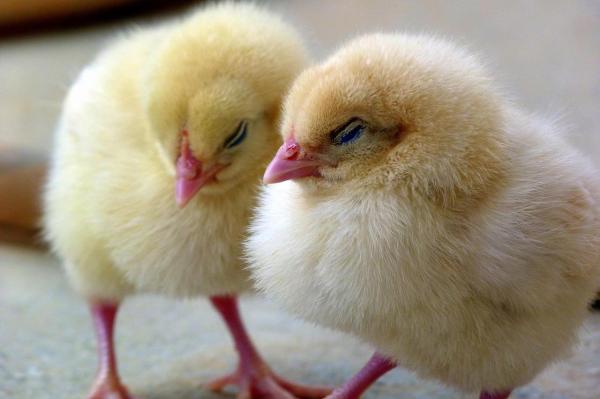
Chicken eye disease
A chicken’s eyes can become irritated and inflamed when living in a high ammonia environment. A high ammonia environment can also lead to chicken respiratory diseases, affecting the sinuses and trachea. If not treated effectively, it can lead to blindness. A high ammonia environment occurs from the union of uric acid in bird manure with water, which forms an environment which is conducive to bacterial growth.
Marek's disease in chickens can also affect a chicken’s eyes, specifically when tumors develop in the iris. Other diseases such as smallpox in chickens also targets the eyes, specifically in the case that lesions occur near the eyes.
Additionally, bacterial or fungal infections in chickens are a leading cause of conjunctivitis in chickens.
Avian pox in chickens
Avian pox in chickens, caused by the avipoxvirus, is an infectious diseases which results in blisters on a chicken or hen’s neck, legs or general body space. These blisters form crusts which can also affect the mouth and throat, hindering breathing.
Prevention can be accomplished with the avian pox vaccine for chickens.
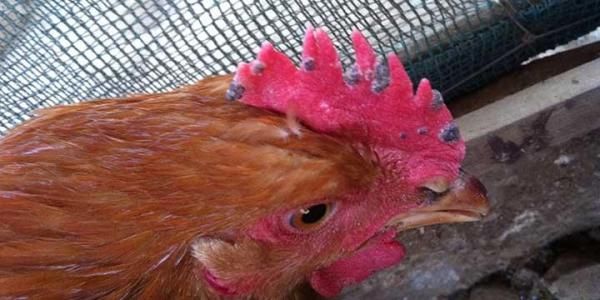
Red mites on chickens
External parasites on chickens, such as mites on chickens, can easily go unnoticed and thus cause considerable damage to a chicken’s organism, specifically because they feed on a chicken’s blood. Mites on chickens can lead to a decrease in egg laying, impeded growth, anemia, weakening of the immune system, thinning, dirty feathers and even mortality.
Mites on roosters can greatly affect their ability to mate, especially because mites tend to cluster around the genital area. Red mites on chickens are generally treated with acaricides.
Chicken mites pictures
The most common types of chicken mites include the red mite, Dermanyssus galinae, which thrive in hotter environments. Knemidocoptes mutans mites can also appear on a chicken’s legs. These chicken mites cause skin thickening, which peel off resulting in scabs and red spots. In addition, the mites may cause leg deformations and are spread by direct contact with other birds.
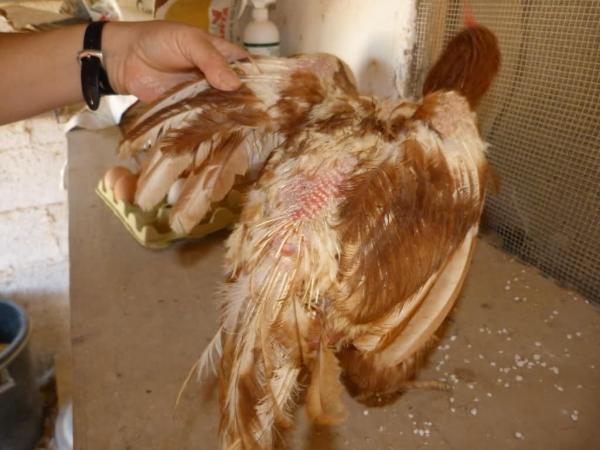
Gout in poultry
Visceral gout in poultry, which is often confused with mites on chickens, is commonly caused by severe renal insufficiency. Gout in chickens results in an accumulation of urates in the joints which inflames the hocks and feet, causing lameness and difficulty moving.
Visceral gout in poultry symptoms include limb deformation and the appearance of sores. Additionally, visceral gout in poultry is more common in roosters from four months of age. It has no cure, but can be managed with improved living conditions, a high quality diet and proper hydration.
For more about chicken leg injuries and how to treat them, we suggest taking a look at our article where we discuss healing a fractured bird leg.
Chicken lice
As we’ve already mentioned, external parasite infestation on chickens are often the most difficult common chicken diseases to detect. Lice in chickens, for example, can result in a loss of weight in chickens, swollen and infected skin, malnutrition and a decrease in egg laying. Chicken lice treatments or prevention includes regularly checking your chicken’s skin and using pestene powder or another poultry lice detergent once the lice are observed.
Lice, unlike chicken mites, can only live on the host, and are less resistant to treatment than chicken mites.
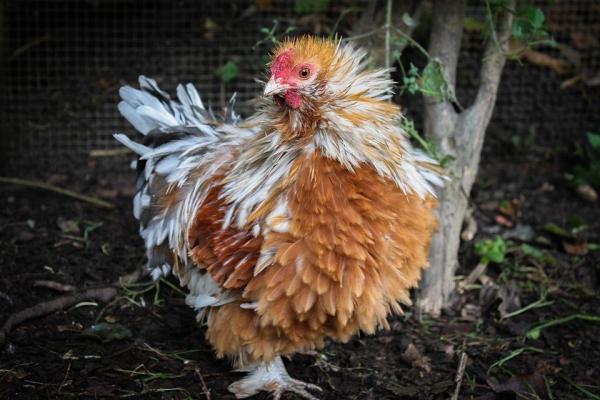
Infectious bronchitis in chickens
Among the most common hen diseases is avian infectious bronchitis. Infectious bronchitis in chickens can vary in severity and result in a decrease in eating and drinking, as increase in nasal and ocular secretions, coughing, panting, a halt in egg laying.
Infectious bronchitis in chickens treatment usually includes antibiotics and a increase in environmental hygiene.
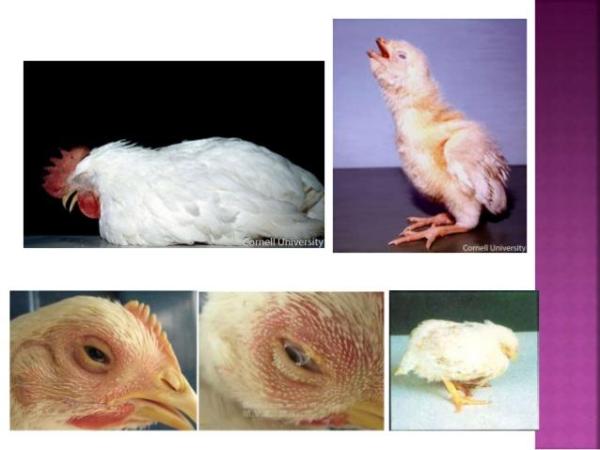
Newcastle disease in chickens
Newcastle disease in poultry is a viral pathology that triggers respiratory and nervous symptoms and can vary in severity.
Newcastle disease virus in chickens symptoms include such as sneezing, respiratory problems, nasal discharge, coughing, greenish and watery diarrhea, lethargy, tremor, torticollis, walking in circles, stiffness, swelling in eyes and neck and/or sudden death. Newcastle disease in chickens is highly contagious and should be prevented at all costs. This virus can be prevented with the application of the newcastle diseases vaccine.
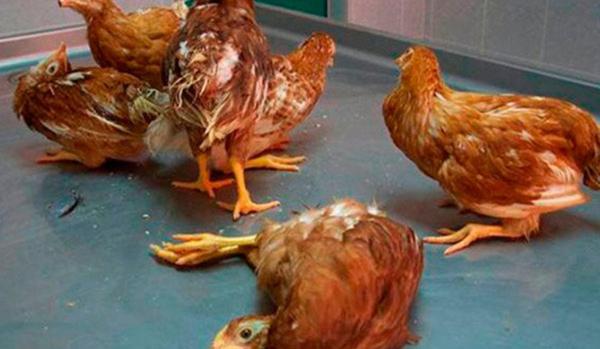
Avian cholera
Avian cholera is triggered by the Pastereulla multocida bacteria and can occur acutely or chronically. Symptoms of avian cholera can include vascular damage, pneumonia, anorexia, nasal discharge, bluish diarrhea and/or sudden death. This chicken disease, if chronic, is characterized by the appearance of skin inflammation. Neurological symptoms such as torticollis can also be observed. Avian cholera prevention includes the application of the avian cholera vaccine. Avian cholera treatment includes the administration of antibiotics.
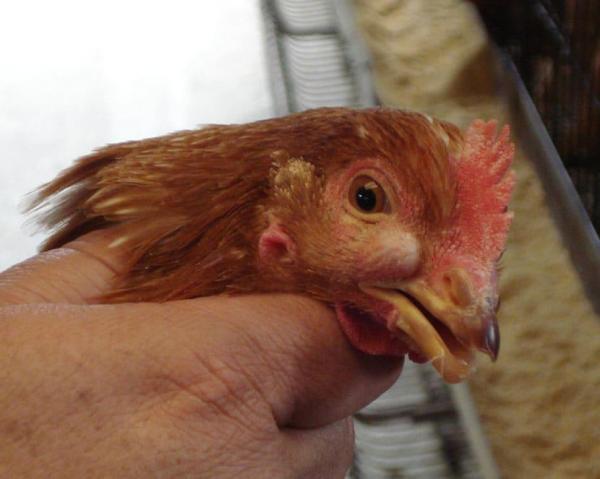
Avian influenza in poultry
Avian influenza in chickens can be fatal. This common chicken virus is similar to that of the flu and is transmitted between birds of different species through contact with infected mucous membranes and/or feces. Avian influenza can also be transported through insects, rodents or clothes.
Avian influenza symptoms include sudden death, a purple coloration in legs and ridges, soft or deformed egg shells, a decrease in laying, a loss of appetite, lethargy, mucous-y stools, coughing, ocular/nasal discharge, loss of appetite, sneezing or a hesitating gait.
Avian influenza treatment involves improving the bird’s immune system with a high quality diet and proper hydration.
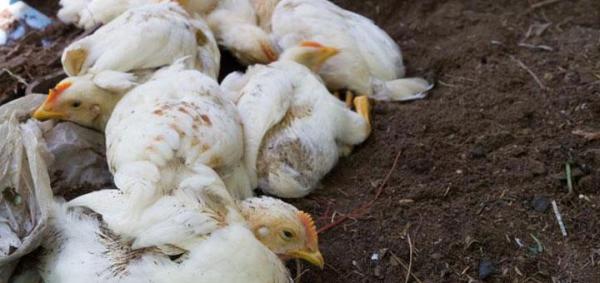
Infectious coryza in chickens
Infectious coryza in poultry is a chicken respiratory disease that manifests as swelling on the face, nasal and ocular secretion, sneezing, coughing, breathing difficulties with wheezing and snoring, anorexia and absence of egg laying. This chicken disease and its symptoms can be treated with antibiotics, since it is a bacterial pathology, but a cure is not always possible.

Mycoplasmosis in chickens
Infectious sinusitis in chickens, also known as mycoplasmosis in chickens, is a chicken disease which can affect all poultry. This common poultry disease is characterized by sneezing, nasal and ocular secretion, coughing, respiratory problems, and swelling in the eyes or sinuses. As mycoplasmosis in chickens is a bacterial disease, it is treated with antibiotics.
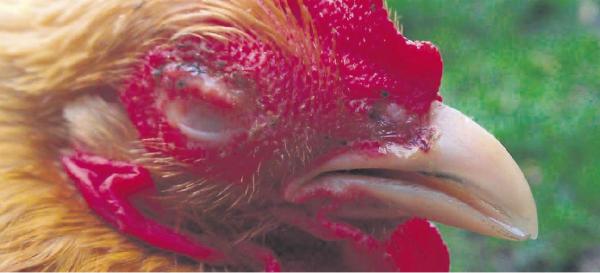
Chicken diseases that affect humans
Now, you may be wondering, which chicken diseases can be transmitted to humans? Humans can catch chicken diseases from chickens feces, air or ingestion. These are known more commonly as zoonotic chicken diseases. Bird flu, although rare, is one of the most well-known chickens diseases humans can catch. Chicken flu or bird flu can vary in severity, and pregnant women and elderly people are at a higher risk of catching it.
Newcastle disease is also contagious to humans, and can result in mild conjunctivitis. In addition, salmonellosis, a bacterial chicken disease, can be acquired by eating eggs. Other bacteria, such as Pastereulla multocida, can cause dermatological lesions in people pecked or scratched by an infected bird.
There are some additional diseases that birds can transmit to humans , but their nonoccurence is rare.
For more, read about the bird diseases humans can catch.
If you do, however, notice any of the above mentioned symptoms of chicken disease, we recommend consulting a veterinarian as soon as possible. Not only is treatment important for the animal, but controlling the disease is key in preventing transmission.
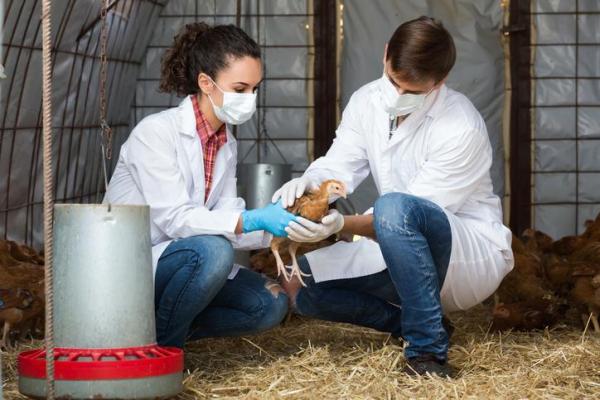
This article is purely informative. AnimalWised does not have the authority to prescribe any veterinary treatment or create a diagnosis. We invite you to take your pet to the veterinarian if they are suffering from any condition or pain.
If you want to read similar articles to 15 Common Chicken Diseases - Causes And Symptoms, we recommend you visit our Other health problems category.
- Gaskin, J., Wilson, H., Mather, F., Jacob, J., & GARCIA, J. (2001). Enfermedades de las Aves Transmisibles a los Humanos. Red EDIS.

